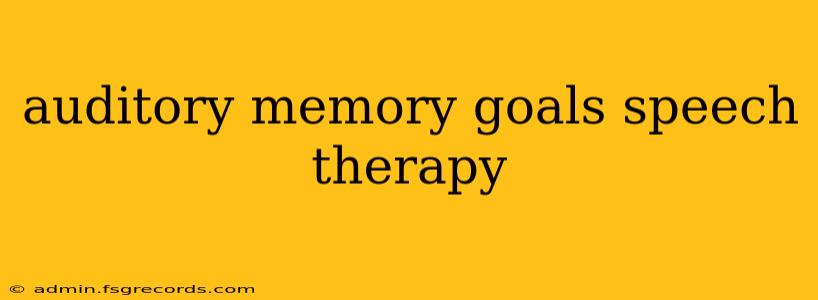Auditory memory, the ability to retain and recall information presented verbally, is crucial for language development and overall academic success. Difficulties with auditory memory can significantly impact a child's (and adult's) ability to follow instructions, understand stories, and participate effectively in conversations. Speech-language pathologists (SLPs) play a vital role in addressing these challenges, setting specific and measurable goals to improve auditory memory skills. This guide explores common auditory memory goals in speech therapy, providing insights into how these goals are established and achieved.
Understanding Auditory Memory and its Impact
Before diving into specific goals, it's essential to understand what constitutes auditory memory challenges. These challenges can manifest in various ways, including:
- Difficulty following multi-step directions: Struggling to complete tasks requiring several sequential steps.
- Poor comprehension of spoken language: Misunderstanding stories, lectures, or conversations due to difficulties retaining information.
- Problems with recalling information: Inability to remember details from a story, conversation, or lesson.
- Challenges with working memory: Difficulty manipulating and processing auditory information simultaneously.
- Struggles with phonological awareness: Difficulties identifying and manipulating sounds in words, impacting reading and spelling skills.
These difficulties can significantly impact a person's ability to learn, communicate effectively, and participate fully in social situations.
Establishing Auditory Memory Goals in Speech Therapy
SLPs carefully assess a patient's auditory memory skills to create individualized goals. These assessments might involve various tasks, such as:
- Digit span tasks: Repeating sequences of numbers.
- Sentence repetition tasks: Repeating sentences of increasing length and complexity.
- Story recall tasks: Recalling details from a spoken story.
- Following multi-step directions: Completing tasks involving a series of instructions.
Based on the assessment results, the SLP creates specific, measurable, achievable, relevant, and time-bound (SMART) goals. These goals are tailored to the individual's needs and abilities.
Examples of Auditory Memory Goals in Speech Therapy
Here are some examples of auditory memory goals, categorized by skill level and focus:
Beginner Level Goals:
- Following 2-step directions with 80% accuracy within 3 sessions. This focuses on building a foundation for auditory processing.
- Repeating sequences of 3 digits with 75% accuracy in 4 sessions. This targets immediate auditory recall.
- Identifying the main idea of a short, simple story with 70% accuracy in 5 sessions. This focuses on comprehension and retention of core information.
Intermediate Level Goals:
- Repeating sentences of 8-10 words with 85% accuracy within 6 sessions. This increases the complexity of the auditory input.
- Recalling 3 details from a short story with 80% accuracy across 5 sessions. This challenges retention of multiple pieces of information.
- Following 3-step directions involving different actions with 90% accuracy in 8 sessions. This progresses the complexity of sequential auditory processing.
Advanced Level Goals:
- Recalling the sequence of events in a longer story with 90% accuracy after listening twice. This focuses on narrative comprehension and organization.
- Repeating complex sentences (12-15 words) with 95% accuracy across multiple sessions. This demands higher-level auditory processing and working memory capacity.
- Summarizing the main points of a short passage with 85% accuracy in 6 sessions. This combines auditory processing with verbal expression.
Strategies and Techniques Used to Achieve Goals
SLPs utilize a variety of techniques to help clients improve their auditory memory skills. These might include:
- Chunking information: Breaking down longer sequences or sentences into smaller, manageable units.
- Repetition and rehearsal: Repeating information aloud to aid memorization.
- Visual aids: Using pictures or diagrams to support auditory input.
- Memory strategies: Teaching mnemonic devices or other strategies to improve recall.
- Games and activities: Engaging in fun and interactive activities to make learning enjoyable.
Monitoring Progress and Adapting Goals
Regular monitoring of progress is crucial. The SLP will track the client's performance on various tasks and adjust goals as needed. This ensures that the goals remain challenging yet achievable, fostering continued improvement.
Disclaimer: This information is for educational purposes only and does not constitute medical advice. Always consult with a qualified speech-language pathologist for personalized assessment and treatment of auditory memory challenges.

